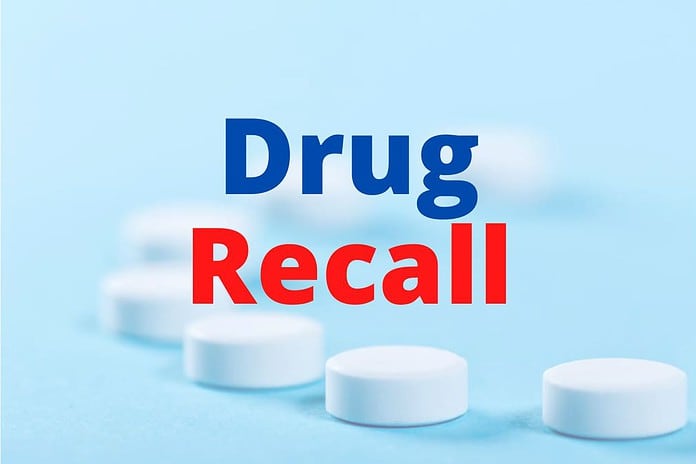Last Updated on December 18, 2024 by The Health Master
Drug recall
Drug recall: The number of batches drug recalled in India due to failing quality tests has seen a concerning increase in recent years.
According to information provided by Minister of State for Health Anupriya Patel to the Rajya Sabha, the number of recalled batches rose significantly from 950 in 2019-20 to a provisional 1,394 in 2023-24.
This upward trend highlights potential issues within the pharmaceutical manufacturing sector and underscores the importance of stringent quality control measures.
A Closer Look at the Drug Recall Data
The data presented by the Minister reveals a clear trend of increasing recalls:
- 2019-20: 950 batches recalled
- 2022-23: 1,171 batches recalled
- 2023-24 (Provisional): 1,394 batches recalled
It’s important to note that this data is based on information received from drug controllers across various states and union territories.
Not of Standard Quality and Spurious Drugs
The Minister also provided data on drug samples that failed quality tests during 2023-24 (April to March):
- Not of Standard Quality: 2,988 samples
- Spurious/Adulterated: 282 samples
These findings led to 604 prosecutions related to the manufacturing, sale, and distribution of spurious or adulterated drugs.
During this period, a total of 106,150 drug samples were tested.
The presence of spurious and adulterated drugs poses a serious threat to public health, emphasizing the need for robust regulatory oversight and enforcement.
Government Initiatives to Enhance Drug Quality
The CDSCO and the Ministry of Health and Family Welfare have implemented several measures to ensure adherence to safety and efficacy standards in drug production.
These include:
Risk-Based Inspections:
Starting in December 2022, the CDSCO, in collaboration with State Drugs Controllers (SDCs), initiated risk-based inspections of drug manufacturing facilities.
Over 500 premises have been inspected so far, focusing on factors like the number of drugs declared as Not of Standard Quality, complaints received, and the criticality of the products manufactured.
This targeted approach allows regulators to prioritize high-risk facilities.
Enforcement Actions:
Based on the inspection findings, over 400 actions have been taken by State Licensing Authorities.
These actions include issuing show cause notices, stop production orders, and suspension or cancellation of licenses/product licenses, in accordance with the Drugs Rules 1945.
Revision of Schedule M:
A significant step taken by the central government is the amendment of the Drugs Rules 1945, specifically revising Schedule M related to Good Manufacturing Practices (GMP) and requirements for premises, plant, and equipment.
Also read related article: Key Notes on Revised Schedule M: Must read
This revised schedule aims to bring Indian manufacturing standards in line with global best practices.
The Revised Schedule M has become effective for drug manufacturers with a turnover of more than ₹250 crores from June 29, 2024.
Key Takeaways
- Drug recalls due to quality issues are on the rise in India.
- Both “Not of Standard Quality” and spurious drugs are a concern.
- The government is taking steps to improve drug quality through inspections, enforcement actions, and revisions to manufacturing standards.
- Increased vigilance and stricter enforcement are crucial to safeguarding public health.
-
What does “Not of Standard Quality” mean?
It refers to drugs that do not meet the prescribed quality parameters in terms of identity, strength, purity, or other specifications.
-
What are spurious drugs?
Spurious drugs are counterfeit or fake medications that may contain incorrect ingredients, no active ingredients, or harmful substances.
-
Why is Schedule M important?
Schedule M outlines the Good Manufacturing Practices (GMP) that pharmaceutical manufacturers must adhere to, ensuring consistent quality and safety of drugs.
Disclaimer: This article contains information derived from the source mentioned below. Our team utilized an AI language model to rewrite and present the news or article in a unique format.
Drug recall: Aurobindo Pharma, Glenmark, Zydus recall Drugs
Drug recall: Lupin recalls 6 lakh bottles of this BP Drug
Drug recall: Cipla recalls over 1.8k boxes of this drug
Drug recall: Dr Reddy’s, FDC recall drugs: A Closer Look
Drug recall: Ascorbic Acid Injection recalled due to this reason
Drug recall: Dr Reddy’s recalls Cinacalcet Tablets due to impurity Concerns
Chemists want Ayurvedic Medicine Under FDA Scrutiny
USFDA issues warning letter to Indoco Remedies for Goa facility
Karnataka creates unified Food and Drug Administration (FDA)
CDSCO to undergo massive Expansion in the coming year
Key Notes on Revised Schedule M: Point No. 9 – Production under Loan License
Action against sale of habit-forming drugs without prescription: Tamil Nadu
Gujarat’s Medical Device Park: A Game-Changer for India’s Healthcare Sector
Key Notes on Revised Schedule M: Point No. 8 – Change Control
Drug recall: Aurobindo Pharma, Glenmark, Zydus recall Drugs
Hospitals can’t force Patients to buy medicines from their in house Medical Store
For informative videos by The Health Master, click on the below YouTube icon:
For informative videos on Medical Store / Pharmacy, click on the below YouTube icon:
For informative videos on the news regarding Pharma / Medical Devices / Cosmetics / Homoeopathy etc., click on the below YouTube icon:
For informative videos on consumer awareness, click on the below YouTube icon:









